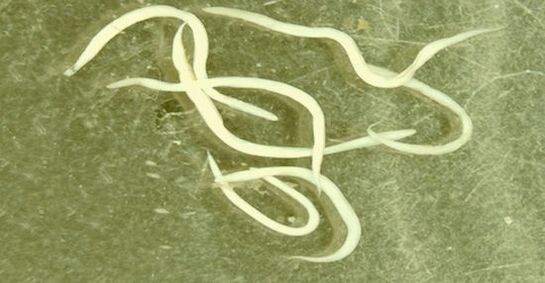
They will be surprised to learn that many people are constantly "not alone. "As well as inside the body, microorganisms are constantly present, and without this mutually beneficial coexistence, a person would become seriously ill and unable to live. Thus, the surface of healthy skin has a normal microflora that protects it from the growth of harmful microbes. Women have lactobacilli or Dederlein rods that form a normal acidic environment in the vagina. Finally, in the large intestine and feces of a healthy person, there are hundreds of billions of microorganisms involved in the digestion of food, the production of vitamins, and the protection of human beings from disease.
But,All random organisms except microbes - protozoa and worms - are also parasites. . . Some begin to multiply, "poisoning" our body. How to detect parasites in the human body?

This question is far from empty. Of course, if the doctor tells you what parasites live in the body of a person with a pointed finger, the patient will immediately go for tests. The same thing will happen, for example, if small worms are accidentally found in fresh feces. The question is clear: a helminthic invasion is imminent. It only remains to confirm the diagnosis and start treatment.
However, parasites have learned to "hold their noses" and often cause incomprehensible changes in their bodies that the sick person does not associate with the presence of parasites. What are these symptoms? For example, how can chronic helminthiasis be suspected?
General symptoms of parasites
The variety of parasitosis, which ends with random (temporary) and persistent parasites in the human body, manifests itself with some symptoms. They can be divided into two groups:
- specific(characteristic of a particular type of parasite), for example, swelling and muscle pain with trichinosis, the development of acute appendicitis when crawling into the ascaris appendix, or intolerable itching in the presence of pinworms in the perianal region.
However, it is good to have such a symptom that clearly indicates the cause of the invasion (called pathognomonic in medicine). But how is it determined that there are no such direct signs of parasites in the human body?
To do this, check for other symptoms characteristic of parasites.
- non-specificSymptoms are signs of poisoning by worms and protozoa.
In turn, these symptoms appear in the form of at most two syndromes:
- allergic reaction of the body to a parasite;
- intoxication syndrome or poisoning.
How to identify parasites in the human body and what symptoms do they cause?
The most common symptoms of parasitosis
- gradual but steady decrease in body weight not related to chronic stress, increase in the level of physical activity;
- appearance of insomnia. Itching of the skin can be caused by the release of toxins during the migration of larvae. In this situation, a person simply experiences a deterioration in well-being in the evening and at night.
- the appearance of nausea and vomiting, sometimes due to aversion to food;
- significant decrease in appetite, including anorexia or complete absence. For example, children with giardiasis often hate breakfast;
- there is obvious weakness, weakness, decreased performance;
- daytime sleepiness appears;
- the temperature rises to subfebrile figures (37. 1-37. 5);
- There is a cephalic syndrome: a headache that is not associated with physical and mental stress appears.

Allergic manifestations of helminthiasis may be different. There may be urticaria, unexplained itching of the skin may appear and disappear, allergic Quincke's edema, bronchospasm may occur.
In this case,If you or your loved ones have any of the above symptoms, consult a doctor. . .
Of course, this does not limit the range of symptoms, but they are the most common.
About laboratory signs
How to identify parasites in the human body using simple tests? For example, when studying the results of a general blood test, the following findings indicate a helminthic infestation:
- anemiaor a decrease in hemoglobin levels and color index;
- eosinophilia. . . Normally, the number of eosinophils does not exceed 5%, and their number increases with parasitic diseases.
Of course, you should not do all the tests alone, the doctor knows better what to prescribe in each case.
About random findings
Sometimes a random finding helps determine the presence of a parasite in the human body. How does this happen?
- for example, by fluorography, an unusual darkness is detected in the lung area, which may be a parasitic cyst;
- During an MRI of the brain, it is generally possible to detect a single or multiple cysts without any symptoms.
As a result, it must be saidOnce these symptoms are detected, a definite diagnosis is made: Immune reactions are established, feces are analyzed, and if necessary, the composition of the duodenum is obtained. Of course, life history is very important. This means that if a person is resting in the hot countries of Asia and Africa the day before and swims in an unsuitable place, or uses water of questionable quality or unwashed fruit, then the chances of helminthic infestation are higher.

Similarly, if a child has similar symptoms after going to school or kindergarten, and parents are convinced that they are not in a stressful situation due to the influence of an organized team, then there is good reason to visit a pediatrician. infectious disease specialist.
Treatment of identified helminthiasis is generally carried out in a special helminthology (parasitology) room in each regional center, which is located in the main infectious diseases hospital.



























